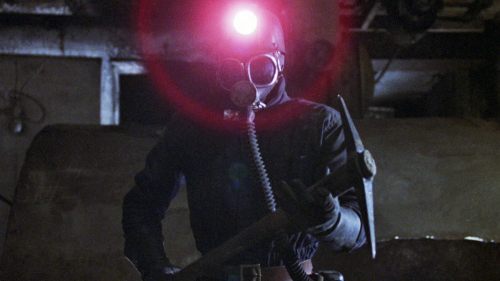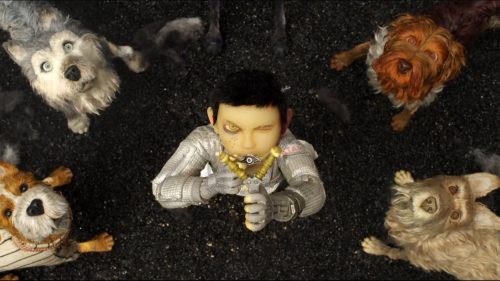The Time SOUTH PARK Took On The Ratings Board (And Mostly Won)
In honor of Sausage Party, which you can buy tickets for here, we’re launching a week of articles focused on raunchy films in genres and formats typically reserved for youngsters.
It's almost perfect timing that I opted to write about South Park: Bigger, Longer & Uncut for this week's theme of controversial cartoons, because the film's plot revolves around the boys "warping their fragile little minds" by sneaking into an R-rated movie, and here we are, seventeen years later, with the MPAA still giving filmmakers headaches because of their erratic and oft-conflicting guidelines. Writer/director Mike Birbiglia set off a minor firestorm last week when complaining that his film got an R-rating for some pot smoking while Suicide Squad features excessive violence and mayhem (not to mention drinking - they've topped off at least one trailer with the "heroes" downing booze) and got away with a PG-13. Not that teens would probably be lining up for an indie comedy about an improv troupe, but that's neither here nor there - the MPAA's rating system needs to change.
That wasn't even a new argument in 1999 when the South Park movie was released. Fifteen years prior, the ratings board introduced the PG-13 rating to split the difference between family friendly PG films and the adult-leaning R movies, but it did little to help the real problem: their total lack of consistency. A filmmaker would follow the lead of a PG-13 film and find his slapped with an R, or make what they thought was perfectly in line with R-rated fare and receive the dreaded NC-17. That rating, which states no children seventeen or under will be admitted even with a parent or guardian, kind of sort of replaced the more taboo X rating, but the effect it has on a film is more or less the same: it won't be advertised in many places, and some theaters might refuse to show it at all. This was the issue facing Trey Parker with his 1997 film Orgazmo, which got an NC-17 despite having very little actual nudity (it was set in/around the porn industry, so sex toys and dialogue made up the bulk of the film's "explicit" nature), and his battles with them clearly still stung two years later when it came time for the South Park film.
Hilariously, Paramount was hoping for a PG-13 rating at first, which Parker and Matt Stone refused, saying if they were going to pull resources and time away from the show (which was in its 2nd and 3rd seasons during the film's production) that it couldn't just be a long episode - it had to take advantage of the freedom of being in theaters instead of basic cable. After some fretting, the studio finally agreed, only to probably regret it once the film was sent to the MPAA and, you guessed it, got an NC-17. The film was submitted a total of SIX times, each time being sent back with the same rating despite containing the cuts they asked for - the last one a mere two weeks before the film's scheduled release. Being a major studio film based on a popular series (not to mention a low-cost surefire success for Paramount during this period of 1999, where they were coming off rather disappointing box office for The General's Daughter and a costly dud in The Out-of-Towners), they absolutely needed an R to make sure the film could reach its intended audience. Luckily, Parker and Stone had Scott Rudin on their side; Rudin is a legendary bully of a producer, and when they called him in a panic, he called Paramount to vent in his particular style, Paramount called the MPAA, and within a day they had their R rating - no additional cutting was necessary.
It'd be silly to think the MPAA's members didn't take particular offense to the film, however - it takes shots at them whenever possible. Again, the movie is about the boys sneaking into an R-rated movie, but in true South Park fashion this naturally leads to consequences for the entire world, as the film (The Terrance and Phillip movie, featuring the classic children's song "Uncle Fucker") is from Canada and therefore the US declares war on their northern brothers. And somehow Satan and Saddam Hussein get involved because the innocent blood spilled from the war will allow the apocalypse to begin. But as the stakes get bigger and the body count rises (312 people are killed on-screen, according to the IMDb trivia), Parker and Stone never miss a chance to take a shot at the idiotic notion that hearing a few bad words (which, when it comes down to it, is mainly what Orgazmo is "guilty" of) will destroy a kid's mind while they can easily walk into the likes of the same year's Bond entry, which wiped out dozens (par for the course) and got its usual PG-13 endorsement. The key shot at the ratings board comes about an hour into the film, when Kyle's mom says "Just remember what the MPAA says: Horrific, deplorable violence is OK, as long as you don't say any naughty words!" Then Parker breaks the fourth wall a tiny bit, as she adds "That is what this war is all about!" (to which Terrance, about to be executed for his "crimes", shouts an incredulous "WHAT?"). It's not much of a stretch to think the entire movie was merely an excuse to mock the MPAA's lack of standards, just as any number of South Park episodes seemingly exist just to take a cheap shot at someone who annoyed them*.
Parker and Stone would face the MPAA again with Team America, once again forced to deal with their nonsensical rules and resubmit the film a whopping NINE times before receiving an R rating. At least they had a sense of humor about the language for the classification, as it's written as "graphic crude and sexual humor, violent images and strong language - all involving puppets", which ties if not tops their all time stupidest rating (Twister's PG-13 for "Intense depiction of very bad weather"). Kirby Dick made a documentary called This Film Is Not Yet Rated about the various battles filmmakers have faced as well as an inside look at their process, but it didn't really do anything - they're still as frustratingly inconsistent and obtuse as ever, as you can see from Birbiglia's recent troubles. Or how about the fact that War Dogs, a film about gun-running and with the protagonists being shot at multiple times in the trailer, has an R rating only for its "strong language, drug use and some sexual references" - nothing about the violent behavior that is presumably just as unsafe for youngsters to see. Despite having to see the South Park film at least six times, it seems no one at the MPAA bothered to take note of its complaint, and I doubt that surprised Parker. Kyle's mom may be a "super King Kamehameha beeyotch", but she hit the nail on the head with her outburst, and the disconnect remains today.
This unexpected theme for the film (I'm not sure I actually knew what it was about when I bought a ticket; if memory serves I was just kind of going along with friends, as I wasn't much of a fan of the show) struck me as rather brilliant. The movie could have been about the boys fighting some new kids for control of the playground or something, and it probably would have been just as successful (perhaps more so), but Parker and Stone opted to use their resources - and the medium - to tackle an issue that had not only personally affected them, but scores of other filmmakers who didn't have a vessel for firing back at the ratings board. Dick's documentary was seven years away - I'm not sure if any feature film prior to this ever really explored the hypocrisy behind their actions, or even mentioned them much at all. Sure, the occasional movie set in Hollywood might throw a reference or two to the ratings process, but I can't recall another that made it part of the actual plot (indeed, on IMDb, the only two movies tagged with "MPAA" for their keywords are documentaries - Dick's and another about censorship in general). Granted, the theme is just one of many in the movie, but I am willing to bet Paramount asked more than once to drop the anti-MPAA stuff and focus on more audience pleasing antics like killing Kenny and the usual celebrity takedowns.
Luckily, their fight was worth the effort - Bigger, Longer and Uncut (a subtitle Parker said no one ever questioned, presumably because they missed the joke) wasn't exactly a blockbuster, but it remains the highest grossing R rated animated film of all time, and despite an acrimonious relationship throughout the film's production Paramount backed Team America a few years later, so we can assume they were happy with the results. And the movie holds up; South Park the show has gotten even more satirically minded over the years (at the time, "message" episodes were fairly uncommon), so I think it's safe to assume the movie's quality proved that there was value in using the cast of crudely animated fourth graders to make a point in between all of the fart jokes. It's also interesting to look at how much the show changed since then - Randy Marsh barely appears in the film, but there's a "Kick the baby" bit and, of course, Kenny dies, which is now a special occurrence but was then a given. And, hilariously, the show gets away with pretty much everything (including the occasional F-bomb) that the movie had and was supposed to distinguish it from its television counterpart. The MPAA may not have changed, but Parker and Stone got their way eventually - here's hoping others stick to their guns just as they did.
*Indeed, when "Blame Canada" lost its Oscar to Phil Collins, an episode that aired only a few weeks later took several shots at the artist in response.




